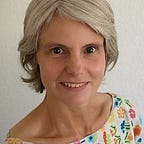Markus Döhring: Think cloudish, Dear Public Sector!
This article handles the question of to which extent academic teaching is linked to real business life. Prof Markus Döhring from University of Applied Sciences in Darmstadt (HAW) faced our asking.
“Don’t be content with an impressive computer. Students of data science should receive a budget with which they decide how to solve a problem.” This is the vision of Professor Markus Döhring, Chair of Data Science at HAW, the University of Applied Sciences in Darmstadt. And he says no, there is no reception at our institute that accepts industry’s requests for our teachings. Question: “Why not, wouldn’t that make sense? In some cases, the industry complains about unworldly academic teaching.”
Döhring affirms as he reflects on this that such a reception point might not be inconvenient. There is a little bit of catching up to do, but not because he and his colleagues are so unrealistic, but because the structures in the public sector could be rethought. And now Döhring answers our question about how academic teaching is to be adapted to the needs of industry in two parts.
We have a feedback loop with the industry. That is good. And there is an infrastructure to reintegrate their response. He states: “Students want their working environment to be available immediately when needed. After finished, they want to throw it back to nirvana.” Hence, cloud technologies are essential to Döhring. But this important cloud-thinking in academic research is still far away from ideal, he says.
The structure reflects the content.
Optimism drives him. Döhring believes that it is necessary to rethink the system. That will gain momentum due to the virtualization impetus caused by Corona. Let us together believe. If the public sector learned to think cloudish, it could at least adapt its teaching at Darmstadt University of Applied Sciences much better to the needs of the industry.
Structure reflects content. This we understood. And by content, Döhring means his teachings in research. After all, he says that universities have a lot of catching up to do in terms of structures, and not surprisingly the exchange with industry already exists. Hardly noticeable gaps. We are convinced that HAW is at a very high level. And Döhring expressly praises once again the very good connections between his school and its industrial partners. Also because of the annual study evaluation, to which representatives from the industry are invited.
Is this really delighting? Döhring laughs: “Sure, you can always improve. This actual state, as you call it, is constantly being adapted. But not through formal reception desks, but more through informal paths. In other words, the university supervises projects directly at the companies. “And we take this feedback with us to our various committee meetings, which take place regularly.”
But let’s get back to structures. For example, HAW offers a study centre for dual students. It is similar to an organizational unit which cares about their interests and, accordingly, those of the companies. He and his colleagues at HAW want to expand this dual-system, so to speak as a supply hose for knowledge between university and industry. “We already have a fairly high proportion of bachelor’s degrees; we are now expanding this dual-model for the data science master’s degree as well.
They gave a promise
A large insurance company has already made a promise: They want to send five students to the Data Science Master’s program at HAW. In this case, the company representatives are directly involved in the design of the study program. “Do a little more on data quality, data cleansing or data governance,” it could whistle from the rooftops.
So that’s the current state of affairs, which is good news. Sounds good to me, Mr Döhring. “Yes, absolutely. But I would also like to say that we are better positioned than the universities. They may handle it a bit more differently, with all the advantages and disadvantages.
And so we slide into the visionary, into the world of daydreaming and want to know what a Professor of Data Science at HAW in Darmstadt would like to see for his students. Now it is time for a change of mentality. Attention, please!
“The young people in the company get a budget with which they can decide for themselves what they need to solve problems.”
Maybe renting a cloud environment for a temporary period? In Döhring’s opinion, that wouldn’t be just a minor adjustment, but a real and important change of mentality.
“Unfortunately, the idea still prevails underneath the students that in the best case they get a nice laptop and don’t have to deal with anything else. Well, that won’t work anymore, especially not in the data science sector.”
And he appeals to the universities to think about how the infrastructure in data science should be provided. “The companies are telling us that students need to think a little bit more about virtualization. That they should learn to solve a data problem on their own. That they shouldn’t be satisfied with a big computer, which they somehow make glow day and night. They should rather learn to decide. They should rather work independently with an allocated budget and devote themselves to a problem.
Döhring is a man with visions, a fighter for his students. He wants to prepare them for these demands. Because he is sure of one thing: This demanded independence will definitely come. Maybe not today, not tomorrow or the day after tomorrow. We learned from Corona, as he says, that some things can accelerate suddenly. You never know what will be the demand for tomorrow.
